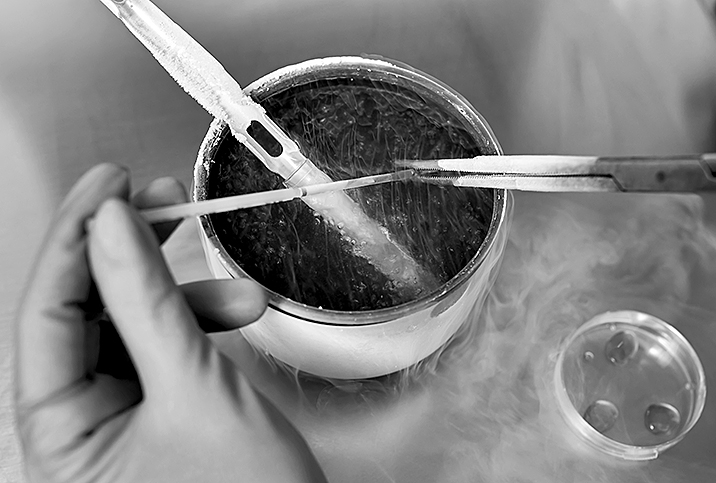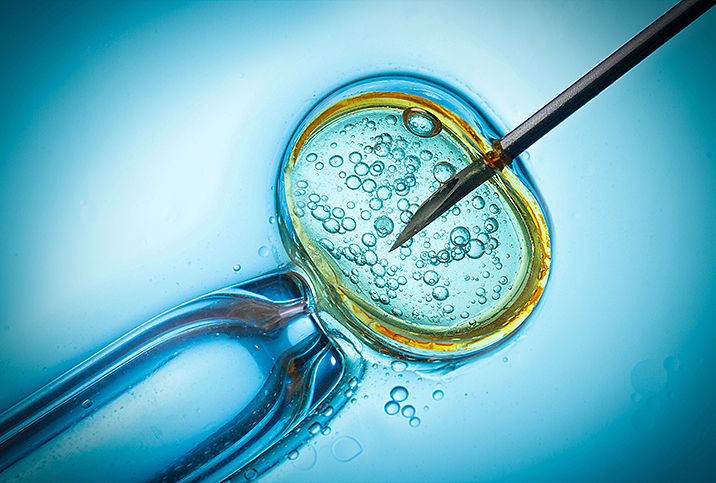Embryo Freezing: Reasons & Risks

Women have many reasons to consider embryo cryopreservation, the procedure by which an embryo is frozen and stored for a later planned pregnancy. And just to be clear, we are not talking about freezing eggs.
The process of freezing embryos involves first fertilizing an egg and allowing its cells to divide. Then, stored at a low temperature, the embryo lives in a state of suspension, thereby maintaining its youth and health. When you’re ready, the embryo is thawed and inserted into the uterus to initiate pregnancy and further development.
Reasons to freeze embryos
Maybe you’re not ready to have a baby just yet, but you or your partner are approaching the tail end of your fertile years and want to make sure you have an embryo all ready to go. Perhaps you’re scheduled for chemotherapy and you’re concerned that the procedure will affect your future ability to produce healthy eggs. Or maybe you’ve already conceived one child using in vitro fertilization (IVF) and have some leftover embryos you’d like to use in the future.
Freezing embryos is also a popular option for LGBTQIA+ people and others who rely on egg or sperm donors.
Whatever your reason, if you want to have a baby, but you’re not ready to do so right now, embryo freezing gives you the gift of time. Consider wisely though, because once the embryo is fertilized, the contributing parents cannot be changed.
Important considerations
Before making such a significant life-changing decision, there are several factors you’ll need to consider, and you should certainly discuss any questions or concerns with a medical professional.
Storage
One of the first questions you’ll want answered is how long frozen embryos maintain their viability. When embryos were first created through IVF, they had to be implanted at once or else be discarded. This often resulted in an increased chance of birthing twins and triplets. Now, using cryopreservation technology, extra embryos can be frozen and safely stored for future pregnancies.
Studies suggest that embryos can result in successful pregnancies even after 20 years of being frozen. It is no longer surprising for reproductive clinics to store frozen embryos for at least 10 years, and some clinics offer storage for as long as 55 years.
Success rate
The success rate of thawing embryos is quite high. Some clinics claim a success rate as high as 90 percent. Though the risk for multiple pregnancies remains, this risk can be minimized by transferring only one embryo at a time, but there’s no guarantee the embryo will implant. And don’t forget the possibility of miscarriage remains, particularly in women older than 35. Women can use a surrogate to carry the embryo, especially if they have had complications with past pregnancies or have been unable to carry a pregnancy.
Cost
Embryo freezing can be an expensive endeavor, and costs vary from clinic to clinic and state to state. The process typically includes fees for egg retrieval (approximately $10,000 to $15,000), genetic testing ($4,000 to $6,000), freezing ($450 to $1,500 per year) and IVF ($12,000 to $18,000). For most cases, insurance companies will not classify embryo freezing as a medically necessary procedure and thus will not contribute to the costs.
Risks
As advanced as embryo freezing may be, there are still risks at various stages in the process.
During ovulation induction, injected fertility hormones stimulate the ovaries to release more eggs for extraction. This excess of hormones can lead to ovarian hyperstimulation syndrome, which causes painful swelling of the ovaries. Only about 5 percent of women using IVF will experience ovarian hyperstimulation syndrome, and its causes and symptoms can be treated with medication.
Additionally, complications such as cramping, bloating, bleeding, infection and damage to bowel, bladder or blood vessels can occur during egg retrieval. These side effects tend to be mild and temporary. More concerning is the slight risk increase—1 to 3 percent—of an ectopic pregnancy, a potentially life-threatening condition in which the embryo implants outside the uterus.
Though generally considered safe, embryo cryopreservation carries a slightly higher risk for the child to have genetic abnormalities and to develop certain childhood cancers, including leukemia and neuroblastoma (brain cancer). Medical experts are quick to note, though, that the likelihood of either condition remains quite low.

















